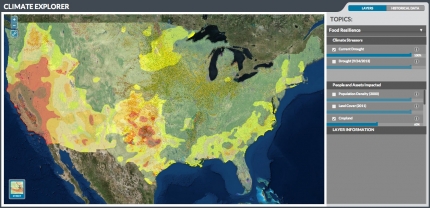A Toolkit to Help Communities Respond to a Changing Climate
It’s been a big week for the United States’ efforts on climate change. On November 12, President Obama and Chinese President Xi Jinping announced historic actions to reduce greenhouse gas emissions. Today, we’re announcing important steps that the Administration is taking here at home to help communities respond to and prepare for a changing climate.
Today, the State, Local, and Tribal Leaders Task Force on Climate Preparedness and Resilience – a group of leaders from across the country who are working to boost resilience efforts in their communities – released recommendations on ways in which the federal government can support actions to address the impacts of climate change.
In response to early input from the Task Force, the Administration has developed the Climate Resilience Toolkit, a website that provides centralized, authoritative, easy-to-use information, tools, and best practices to help communities prepare for and boost their resilience to the impacts of climate change.
You can access the toolkit here: toolkit.climate.gov
The Climate Resilience Toolkit provides information from across the federal government to meet the information needs of communities, interested citizens, businesses, resource managers, planners, and policy leaders at all levels of government. It includes:
- The Climate Explorer: A visualization tool that offers detailed maps of climate stressors and impacts, as well as interactive graphs showing daily observations and long-term averages from thousands of weather stations across the nation.
- Steps to Resilience: A five-step process that users can follow to initiate, plan, and implement projects to help make their homes, communities, and infrastructure more resilient to climate-related hazards.
- “Taking Action” Stories: More than 20 real-world case studies describing climate-related risks and opportunities that communities and businesses face, steps they’re taking to plan and respond, and tools and techniques they’re using to improve resilience.
- Federal Resource Database: The Toolkit provides centralized access to federal sites for future climate projections, as well as freely available tools for accessing and analyzing climate data, generating visualizations, exploring climate projections, estimating hazards, and engaging stakeholders in resilience-building efforts.
The Toolkit is a key piece of the President’s Climate Action Plan and builds upon the Administration’s efforts to boost access to data and information through resources such as the National Climate Assessment and the Climate Data Initiative. Like the Climate Data Initiative, the Toolkit will evolve based upon the information needs of various sectors. Today, the Toolkit is launching with resources to help communities address coastal flooding, food resilience, human health, and ecosystem vulnerability, and in the coming months, it will be updated with resources to help decision-makers plan for climate impacts related to water security, energy, and transportation risks.
This Toolkit’s resources are a perfect example of the kind of actionable information that the federal government can provide to address the growing challenges posed by climate change. We look forward to continuing to work with leaders from across the country to provide the tools, information, and support they need to build healthy and climate-ready communities.
White House Blogs
- The White House Blog
- Middle Class Task Force
- Council of Economic Advisers
- Council on Environmental Quality
- Council on Women and Girls
- Office of Intergovernmental Affairs
- Office of Management and Budget
- Office of Public Engagement
- Office of Science & Tech Policy
- Office of Urban Affairs
- Open Government
- Faith and Neighborhood Partnerships
- Social Innovation and Civic Participation
- US Trade Representative
- Office National Drug Control Policy
categories
- AIDS Policy
- Alaska
- Blueprint for an America Built to Last
- Budget
- Civil Rights
- Defense
- Disabilities
- Economy
- Education
- Energy and Environment
- Equal Pay
- Ethics
- Faith Based
- Fiscal Responsibility
- Foreign Policy
- Grab Bag
- Health Care
- Homeland Security
- Immigration
- Innovation Fellows
- Inside the White House
- Middle Class Security
- Open Government
- Poverty
- Rural
- Seniors and Social Security
- Service
- Social Innovation
- State of the Union
- Taxes
- Technology
- Urban Policy
- Veterans
- Violence Prevention
- White House Internships
- Women
- Working Families
- Additional Issues



